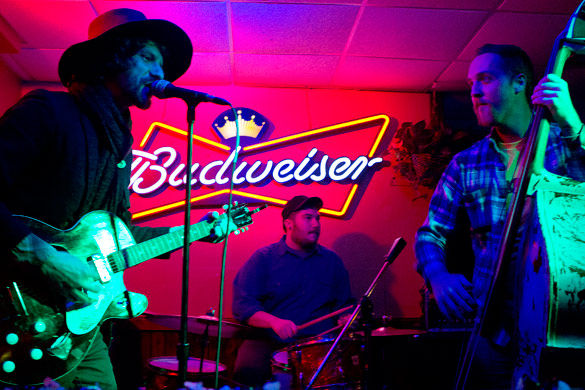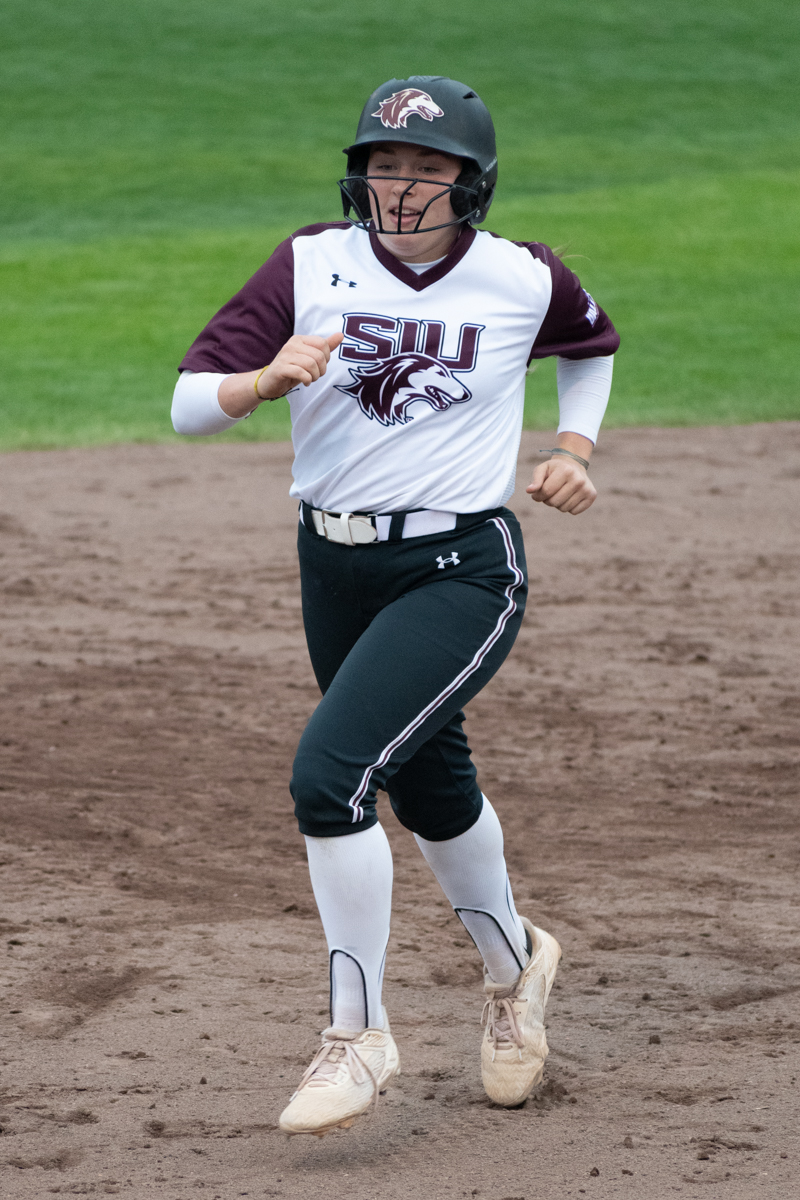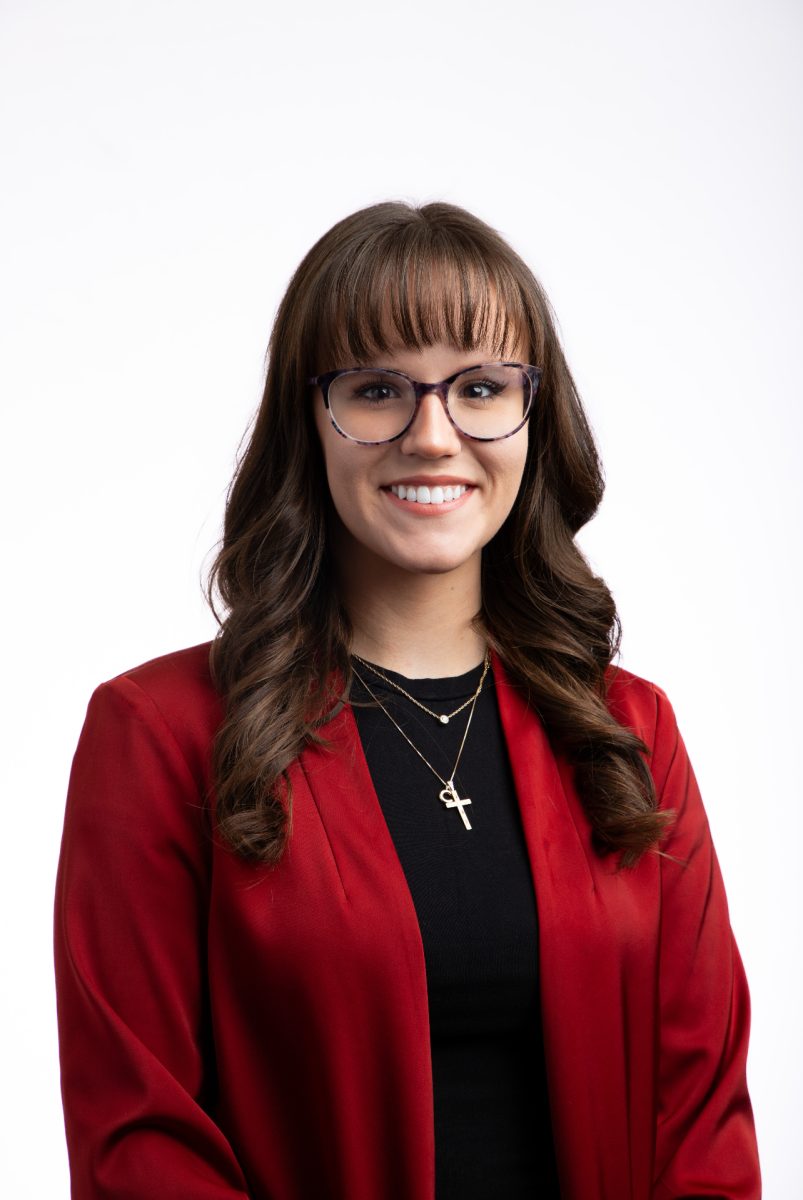Wild Murphy and the New Year excel in improvisation

November 7, 2013
Whenever they are not playing in other various projects, Wild Murphy and the New Year come together to play uplifting and often-improvised folk songs.
The duo of Josh Murphy and Chris Goode are familiar faces to the southern Illinois music scene. Murphy, a 15-year veteran of the guitar, is known for his talents as a singer/songwriter in the Black Forty’s and the more recent William Feigns; Goode has drummed for a variety of acts including the Heat Tape and the Redbyrds, as well as vocals for the punk band the Shakes.
Murphy used to study the worship leader’s hands as he played guitar at church, which helped him learn. His mom, aunt and grandma used to sing old church hymns, which was also an influence to his writing style.
Advertisement
Goode has played drums for nearly a decade, ever since he got his blue-glittered Ludwig kit at 16 years old. He plays with a variety of musicians because it allows him to broaden his range as a drummer; it keeps his mind open to trying new ideas musically, too.
“One thing I will put together before I’m old and grey will be a drum line — not Nick Cannon — but a cool drum corps that gets together during the summer and writes some interesting cadences,” Goode said.
When the two West Frankfort natives collaborate, they become the personae Wild Murphy and the New Year. Many of their songs have a gospel spirit. Although they don’t necessarily play gospel songs, Murphy’s lyrics offer an element of redemption that are inspiring like gospel tunes.
“When I die Lord I’ll find a home/When I die Lord I’ll find a home/There will be no more feeling alone/Tell my mother that I do miss her/Tell my sister I’ll feel her pain/Tell my brother I’ll be there with him,” Murphy sings on “I’ll Find a Home.”
Murphy’s soft-echoing guitar melodies often open the songs along with a pleasing verse he sings until Goode’s snare and ride leisurely crescendo into the chorus that brings everything together into a dense and harmonious sound.
Joining Wild Murphy for Saturday’s performance was Kasey Rogers, who occasionally fills in at upright bass. Rogers is an instrumentalist version of Inspector Gadget. He can genuinely play an array of instruments: guitar, bass, — electric and standup — drums, harmonica, vocals and more.
He is not the type of person who learns the opening riff to “Smoke on the Water” and then claims to know guitar; Rogers can play with a complexity that spans a vast genre of music, and he does it effortlessly and usually without error. His hopping bass lines complement the homely sound of Wild Murphy as he improvises through many of the songs.
Advertisement*
What partially gives the band its character is everyone’s ability to improvise rather than forcing themselves to play a dressed-up set keeping the music fresh for everyone. It’s not often that the band practices, but Murphy said he hopes that keeps the audience interested in what will happen next.
“Last time we practiced the cops came, so we don’t really practice often,” Murphy said.
Goode said improvising comes with time and playing with different people.
“We do have a read on each other,” he said. “Sometimes it’s body language; sometimes it’s a look; sometimes you can just tell. You just gotta be able to swing.”
Murphy said playing with Goode since forming Wild Murphy in 2010 has offered more freedom.
“Since I started playing with Chris, it’s been much easier to improvise things,” he said. “If you do anything for 15 years, you’ve got to find some spontaneity somewhere. He just got what I was trying to do quickly.”
During a recording and practice session above the Huffman-Harker and Walker Funeral Home in Carbondale, the three play through a series of songs written by Murphy as well as some covers — “Tower of Song” by Leonard Cohen and “I’m Waiting for the Man” by the Velvet Underground. Watching them improvise is quite impressive; they all appear poised as Murphy strums his ’65 Silvertone guitar through “Come on Medusa.” Rogers instantly picks up on what Murphy is playing just by studying his fingers for a few seconds.
Before taking the stage at Tres Hombres, Murphy puts on his traveler’s hat as he prepares to embark on a journey of guileful folk music with his comrades.
After playing a few songs, including a cover of Bob Dylan’s “It Takes a Lot to Laugh, It Takes a Train to Cry,” Rogers joins the band with his baby-blue chipped Carlo Robelli upright bass. Rogers looks like a stoic Hulk Hogan as he peersa past the crowd while slapping the bass strings and sporting his authentic Hulk Hogan-esque mustache and “Hulkamania” t-shirt he wore for Halloween.
Murphy taps his toe and stomps his foot during “Where My Hellhounds Roam,” a song he wrote in Seattle about places you can’t go back to anymore.
“There is no trespassing where my hellhounds roam/There is no trespassing where my hellhounds roam/Just moonbeams for the passerby/Villains and saints alike know there is no home where my hellhounds roam,” he sings.
Goode gaily sings along with one of Murphy’s songs while looking out to his friends in the crowd. He plays a catchy rhythm part as the snare drum trots along with Murphy until the strike of the ride cymbal leads the song into the chorus.
If they did much improvisation during the set, it was hardly obvious. The day after the Tres Hombres performance, while listening to the recordings of their practice session, Murphy points out a moment when Goode and he were playing on a whim during a part that would have simply sounded like a tuneful and extended transition to someone other than them. Murphy seemed pleased with that improvised moment and that’s the way he likes it.
Murphy likes to either crowd himself or be completely isolated when writing a new song. On one hand, being in an extremely crowded area provides subject matter; but being alone allows for a more imaginative space. To him, song meanings can change in the same way that human perceptions change.
“You can maybe write it in a certain spirit, and it means a certain thing to you then because maybe you’re dealing with something or working something out, in more of an emotion sense,” Murphy said. “But then you can change it later in case you don’t feel that same way anymore.”
Whether it involves taking music from a six-piece band and making it work with a duo, or if he’s playing through the candid, improvised moments of a set, Murphy often tries to look past the central points of music and poetry allowing for openness in creativity and interpretation.
He compares those moments to looking through a kaleidoscope.
“You have these little jewels in the back of that thing; but you never see that whenever you’re looking inside. You just see fragments and mirrors of that initial thing, which you never get the initial thing,” Murphy said.
“I think I like that in writing and in sound. I don’t really need the central point so much; I like seeing the vast array of mirrors around everything reflecting the source.”
And those moments, when translated into a Wild Murphy and the New Year song, offer a little beacon of hope for the wondering and curious soul.
Advertisement







